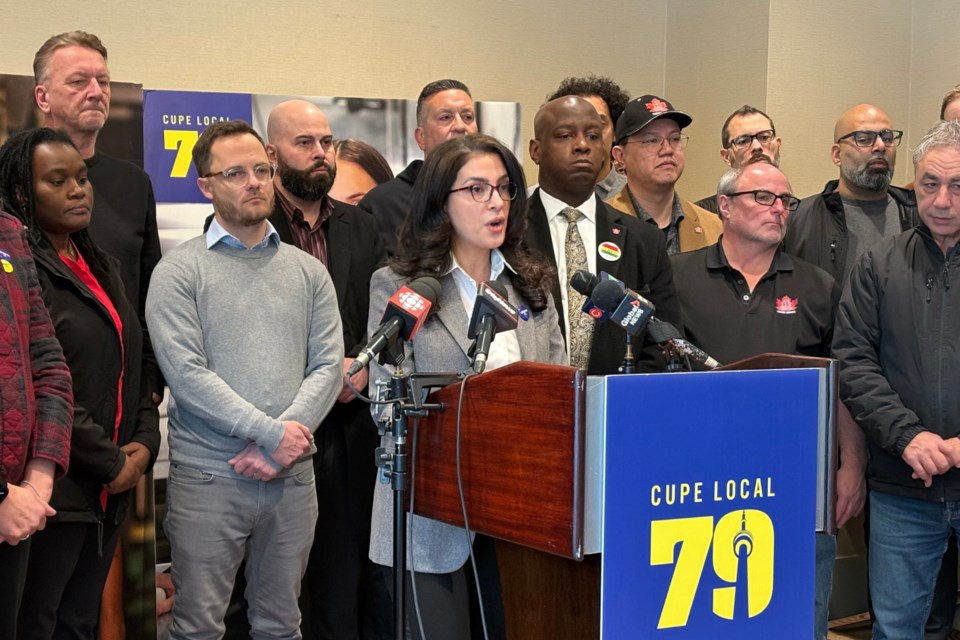The City of Toronto on Wednesday evening received a no-board report signalling members of the union representing 30,000 of its indoor workers are gearing up for a possible strike.
A no-board report means negotiations between both parties, Canadian Union of Public Employees Local 79 (CUPE79) and the City of Toronto, are at an impasse.
The Ontario Ministry of Labour granted the no-board report to allow CUPE79 to be in a legal strike position — and the city in a legal lockout position — at 12:01 a.m., or one minute past midnight, on Saturday, March 8, 2025.
In a statement released Wednesday, the city said it is "firmly committed to the bargaining process,"
Officials are aiming to reach "a fair and reasonable agreement that recognizes the vital contributions of City employees while ensuring value for Toronto residents and businesses," the city said.
The city hopes to reach an agreement during the 17-day period before the strike and lockout deadline.
A proposal has been tabled and is awaiting the union's reply, the city said.
How would Toronto be affected by a CUPE79 strike?
The union’s members work in areas like public health, ambulance dispatch, shelter services, water and food inspection, childcare and long-term care, among other services.
If CUPE79 members were to go on strike, the city has assured it has contingency plans in place to continue delivering critical services that residents, visitors and businesses rely on.
Details of the city's contingency plans have yet to be announced.
During a press conference on Thursday, CUPE79 president Nas Yadollahi said the city will be unable to function without the union’s 30,000 workers.
Yadollahi said CUPE79 “didn’t ask for this strike, but won’t back down.”
“Our backs are up against the wall. We don't want to be in this position, but as the city refuses to negotiate a fair deal, the impact will be felt by every Torontonian,” she continued.
Yadollahi said the vital services that locals rely on every day will come to a halt under a strike. This includes community recreation programs, childcare centres, employment and social services, the city’s 311 service and much more, she listed.
“We need Torontonians to know this fight is about you too. These are your workers. These are your public services, and this is your fight.”
What does CUPE79 want?
Among other items, CUPE79 is seeking better pay for union members, many of whom make minimum wage and lack benefits, according to CUPE79 president Nas Yadollahi.
The union also pointed to a crisis in staffing across city positions.
The staffing crisis is most acute in long-term care facilities, where there are over 500 job vacancies across Toronto, representing a 700 per cent increase since the COVID-19 pandemic.
City officials have offered CUPE79 the same general wage increases that were successfully negotiated with Toronto Civic Employees Union Local 416, which consists of the city's outdoor workers.
Members of the latter union, CUPE416, will see wage increases of between three and 3.95 per cent year-over-year — a 3.95 per cent increase in 2025, 3.9 per cent in 2026, 3.8 per cent in 2027 and three per cent in 2028.
The city has noted both unions’ members are “all part of the same labour environment” and have “received the same general wage increases” for the last 25 years.
Last week, Yadollahi pushed back on that characterization and said CUPE79 represents an “entirely different workforce.”
“While that deal may have been appropriate for [CUPE416], it is not going to be something that we can accept,” she said.
On top of the proposed three and 3.95 per cent year-over-year wage increases, the city said it has “offered to discuss” special wage hikes for nurses and municipal standards officers to bring their pay up to market levels.
Last month, over 90 per cent of CUPE79 workers voted in favour of a strike mandate.
CUPE79 has been at the bargaining table with the city since late November 2024. The union’s contract expired at the end of 2024.
— with files from TorontoToday's Kathryn Mannie
